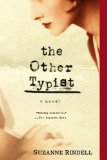Summary | Excerpt | Reading Guide | Reviews | Beyond the Book | Readalikes | Genres & Themes | Author Bio

Critics' Opinion:
Readers' Opinion:
First Published:
May 2013, 368 pages
Paperback:
Apr 2014, 368 pages
 Book Reviewed by:
Book Reviewed by:
Amy Reading
Buy This Book
1
They said the typewriter would unsex us. One look at the device itself and you might understand how they— the self-appointed keepers of female virtue and morality, that is—might have reached such a conclusion. Your average typewriter, be it Underwood, Royal, Remington, or Corona, is a stern thing, full of gravity, its boxy angles coming straight to the point, with no trace of curvaceous tomfoolery or feminine whimsy. Add to that the sheer violence of its iron arms, thwacking away at the page with unforgiving force. Unforgiving. Yes; forgiving is not the typewriter's duty.
I don't suppose I know much about the business of forgiveness, either, as my job has so much to do with the other end of it. Confessions, I mean. Not that I extract them— that is for the Sergeant to do. Or for the Lieutenant Detective to do. But it is not for me to do. Mine is a silent job. Silent, that is, unless you consider the gunshot clacking of the typewriter that sits before me as I transcribe from a roll of stenotype paper. But even then I am not the originator of this ruckus, as after all, I am only a woman—a phenomenon the Sergeant seems to observe only as we are exiting the interrogation room, when he touches my shoulder gently and says with great and solemn dignity, "I am sorry, Rose, that as a lady you must hear such things." He means the rape, the robbery, whatever it is we have just heard confessed. At our precinct, located in the borough of Manhattan in what is known as the Lower East Side, we are rarely left wanting for more crimes to hear.
I know that when the Sergeant uses the term lady he is being kind. It is 1924—soon to be 1925—and I am somewhere between what passes for a lady and a woman these days. The difference, of course, is partly a matter of education, which, in having matriculated at the Astoria Stenographers College for Ladies, I can—to a very modest extent—claim, but is also partly a matter of breeding and affluence, which, as an orphan with an income of ?fteen dollars a week, I cannot claim. And of course there is the question of employment itself. Tradition holds that a lady may have pursuits, but never a job, and I, preferring a life with a roof over my head and regular meals to one without such things, am obliged to maintain the latter.
That is most likely what they meant when they said the typewriter would unsex us—it would deliver us out of our homes, not into the sewing factory or the steam laundry, but into law offices and accounting ?rms, where previously only male steps have fallen. That we would unlace our apron strings and instead button ourselves into the starched shirts and drab navy skirts that promise to neuter us. They feared the perpetual state of being surrounded by all those technological contraptions— the stenotypes, the mimeographs, the adding machines, the pneumatic mail tubes—would somehow harden us, and our soft, womanly hearts would grow rigid in an envious imitation of all that iron, brass, and steel.
I suppose it's true that knowing how to type has brought the fairer sex into some rather masculine work environments—like the police precinct, where we typists constitute a feminine minority. True enough, one has probably heard about or even glimpsed the occasional police matron in Manhattan—those stodgy old grandmothers employed to save the men from the false accusations of impropriety that all too often come along with having to herd prostitutes like so many sheep on a daily basis. But the Sergeant does not believe in police matrons and refuses to hire them. If it were not for the fact they need so much typing done and cannot do it themselves, there would be no women employed at our precinct at all. The typewriter is indeed my passport into a world otherwise barred to me and my kind.
Excerpted from The Other Typist by Suzanne Rindell. Copyright © 2013 by Suzanne Rindell. Excerpted by permission of Amy Einhorn Books. All rights reserved. No part of this excerpt may be reproduced or reprinted without permission in writing from the publisher.





The Funeral Cryer by Wenyan Lu
Debut novelist Wenyan Lu brings us this witty yet profound story about one woman's midlife reawakening in contemporary rural China.
Your guide toexceptional books
BookBrowse seeks out and recommends the best in contemporary fiction and nonfiction—books that not only engage and entertain but also deepen our understanding of ourselves and the world around us.